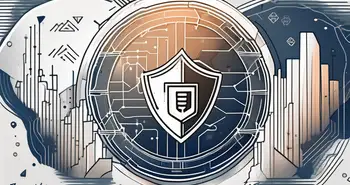How to Secure your Cryptocurrency

Cryptocurrency has revolutionized the way we handle transactions and store our wealth. With its decentralized nature and robust encryption, it provides a level of financial freedom that traditional banking systems cannot match. However, with great power comes great responsibility. It is crucial to protect your cryptocurrency assets from potential threats. In this guide, I will walk you through the essential steps to secure your cryptocurrency holdings and ensure peace of mind.
Understanding Cryptocurrency Security
Before delving into the practical steps, it is crucial to understand the importance of cryptocurrency security. With the digital world being prone to hacking attempts and scams, securing your cryptocurrency is akin to protecting your physical wallet. By implementing the right security measures, you can safeguard your investments and prevent potential losses.
The Importance of Cryptocurrency Security
Managing your cryptocurrency without proper security measures is like leaving your front door unlocked. With the increasing prevalence of hackers and cybercriminals, it is essential to take the necessary precautions. By securing your cryptocurrency, you protect yourself from potential theft, phishing attacks, and fraud.
Furthermore, cryptocurrency security is not just about protecting your own assets. It also contributes to the overall stability and trustworthiness of the entire cryptocurrency ecosystem. When individuals prioritize security, it creates a safer environment for everyone involved, fostering confidence and encouraging wider adoption of digital currencies.
Basic Concepts in Cryptocurrency Security
There are a few fundamental concepts that you need to understand in order to fortify your cryptocurrency security. One of the most important is the concept of private keys. Your private key is like a password that enables you to access and transfer your digital assets. It is crucial to keep this key secure and not share it with anyone.
Private keys are typically stored in digital wallets, which act as the interface between you and the blockchain network. These wallets come in various forms such as software wallets, hardware wallets, and online wallets. Each type has its own level of security, and it is essential to choose one that aligns with your needs and risk tolerance.
Software wallets are applications that you install on your computer or smartphone. They provide convenient access to your cryptocurrency but may be vulnerable to malware or hacking if your device is compromised. Hardware wallets, on the other hand, are physical devices specifically designed to store private keys offline. They offer enhanced security by keeping your keys isolated from internet-connected devices.
Online wallets, also known as web wallets, are hosted on the cloud by a third-party service provider. While they offer convenience and accessibility from any device with an internet connection, they are generally considered less secure compared to software or hardware wallets. It is crucial to research and choose a reputable online wallet provider if you opt for this type of wallet.
In addition to private keys and wallets, another important aspect of cryptocurrency security is the use of two-factor authentication (2FA). This additional layer of security requires you to provide a second form of verification, such as a unique code sent to your mobile device, when accessing your cryptocurrency accounts. Implementing 2FA can significantly reduce the risk of unauthorized access to your digital assets.
Furthermore, staying updated with the latest security practices and being cautious of potential threats is vital in maintaining cryptocurrency security. Regularly updating your wallet software, using strong and unique passwords, and being wary of phishing attempts are some of the best practices to follow.
By understanding and implementing these basic concepts in cryptocurrency security, you can enhance the protection of your digital assets and minimize the risk of falling victim to cyberattacks or fraud. Remember, in the world of cryptocurrencies, security should always be a top priority.
Setting Up a Secure Cryptocurrency Wallet
Choosing the right cryptocurrency wallet is the foundation of your security strategy. Let's explore the steps you should take to ensure your wallet is secure.
Choosing the Right Cryptocurrency Wallet
When selecting a wallet, prioritize security features such as two-factor authentication and hierarchical deterministic (HD) wallet structures. These features add an extra layer of protection to your wallet and make it difficult for hackers to gain unauthorized access.
Two-factor authentication (2FA) is a security measure that requires you to provide an additional piece of information, such as a unique code from an app or a physical device, to log into your wallet. By enabling 2FA, you are adding an extra layer of security that significantly reduces the risk of unauthorized access to your funds.
Another important feature to consider is the hierarchical deterministic (HD) wallet structure. This type of wallet generates a new address for each transaction, making it harder for anyone to track your transactions and associate them with your wallet. HD wallets also allow you to create a backup seed phrase, which can be used to restore your wallet in case of loss or theft.
Steps to Secure Your Wallet
Once you have chosen a wallet, it is essential to follow best practices to reinforce its security. Start by setting a strong password that includes a combination of uppercase and lowercase letters, numbers, and symbols. This will make it much harder for anyone to guess or crack your password.
Remember to never reuse passwords across different platforms or accounts. Each password should be unique to your cryptocurrency wallet to minimize the risk of a security breach.
Additionally, enable two-factor authentication (2FA) to add an extra layer of security. 2FA requires you to provide an additional piece of information, such as a unique code from an app or a physical device, to log into your wallet. This ensures that even if someone manages to obtain your password, they still cannot access your funds without the second authentication factor.
Regularly update your wallet software to benefit from the latest security patches and improvements. Wallet developers often release updates to address any vulnerabilities or weaknesses that may have been discovered. By keeping your wallet software up to date, you are reducing the risk of falling victim to known security issues.
Always be vigilant and keep an eye out for any suspicious activities in your wallet. Monitor your transactions regularly and verify that they are legitimate. If anything seems out of the ordinary, take immediate action to secure your assets.
Furthermore, consider using a hardware wallet for an added layer of security. Hardware wallets are physical devices that store your private keys offline, making it virtually impossible for hackers to gain access to your funds remotely. These devices are designed to be resistant to malware and other forms of cyber attacks, providing you with peace of mind knowing that your cryptocurrencies are stored in a secure offline environment.
In conclusion, setting up a secure cryptocurrency wallet involves careful consideration of the wallet's features, implementing strong passwords, enabling two-factor authentication, keeping the software up to date, and being vigilant for any suspicious activities. By following these steps, you can significantly enhance the security of your cryptocurrency wallet and protect your valuable digital assets.
Implementing Two-Factor Authentication
Two-factor authentication (2FA) is an additional security measure that adds an extra layer of protection to your cryptocurrency accounts. It requires you to provide two different pieces of information to verify your identity. Let's explore how you can enable 2FA for your cryptocurrency accounts.
What is Two-Factor Authentication?
Two-factor authentication is a security process that requires two different forms of identification to log into an account. It enhances security by combining something you know (such as a password) with something you have (such as a unique verification code).
Implementing two-factor authentication is crucial in today's digital landscape where cyber threats are becoming increasingly sophisticated. By adding an extra layer of security, you significantly reduce the risk of unauthorized access to your cryptocurrency accounts.
How to Enable Two-Factor Authentication
To enable 2FA for your cryptocurrency accounts, start by downloading a reputable authenticator app on your smartphone. Some popular options include Google Authenticator, Authy, and LastPass Authenticator.
Once you have the app installed, navigate to your account settings on the cryptocurrency exchange or wallet platform. Look for the 2FA section and follow the prompts to link your account to the authenticator app. This will generate a unique code that changes every few seconds.
Enabling 2FA is a straightforward process that only takes a few minutes. However, the benefits it provides in terms of security are invaluable. By taking this simple step, you significantly reduce the risk of unauthorized access to your cryptocurrency accounts.
Now, every time you log into your cryptocurrency account, you will be prompted to enter the verification code from your authenticator app. This adds an extra layer of security, as even if someone manages to obtain your password, they would still need access to your smartphone to log in.
Additionally, some authenticator apps also offer the option to receive verification codes via SMS or email as a backup method. This ensures that even if you lose access to your smartphone, you can still log into your account using the backup codes.
It's important to note that enabling two-factor authentication is not a one-time process. You should regularly update your authentication app and review your security settings to ensure maximum protection for your cryptocurrency accounts.
In conclusion, implementing two-factor authentication is a crucial step in safeguarding your cryptocurrency accounts from unauthorized access. By combining something you know (your password) with something you have (the verification code from your authenticator app), you add an extra layer of security that significantly reduces the risk of cyber threats. Take the time to enable 2FA for your cryptocurrency accounts today and enjoy peace of mind knowing that your digital assets are well-protected.
Using Hardware Wallets for Enhanced Security
If you are serious about the security of your cryptocurrency, investing in a hardware wallet is an excellent option. Hardware wallets are physical devices specifically designed to store and protect your digital assets.
Benefits of Hardware Wallets
One of the main benefits of hardware wallets is their offline storage capability. Since hardware wallets are not connected to the internet, they are immune to online threats such as hacking attempts and malware. This significantly reduces the risk of your cryptocurrency being stolen.
Hardware wallets also utilize secure elements and encryption to protect your private keys. This adds an extra layer of security and ensures that even if your device is lost or stolen, your funds remain safe.
Top Rated Hardware Wallets
If you decide to go down the hardware wallet route, some top-rated choices include Ledger Nano X, Trezor Model T, and KeepKey. These wallets offer advanced security features and user-friendly interfaces to make managing your cryptocurrency a breeze.
Safe Cryptocurrency Transactions
Now that you have set up a secure wallet and implemented additional security measures, it is important to conduct your cryptocurrency transactions in a safe manner.
How to Conduct Secure Transactions
When sending or receiving cryptocurrency, make sure to double-check the recipient's address. Cryptocurrency transactions are irreversible, so any mistakes or fraudulent activities can result in permanent loss of funds.
For added security, consider using a new address for each transaction. This reduces the likelihood of someone tracking your transactions and discovering your identity.
Furthermore, keep your computer and wallet software up to date with the latest security patches. Regularly backup your wallet to external devices, such as USB drives or offline storage, to protect against data loss or hardware failures.
Avoiding Common Transaction Scams
Cryptocurrency scams are unfortunately prevalent in the digital world. One of the most common scams is phishing, where malicious actors attempt to trick you into revealing your private keys or login credentials through fake websites or emails.
To avoid falling victim to scams, never click on suspicious links or provide sensitive information on untrusted platforms. Always double-check the website's URL and ensure you are visiting the official website of the cryptocurrency exchange or wallet provider.
By following these best practices and implementing the necessary security measures, you can secure your cryptocurrency holdings and protect them from potential threats. Remember, it is better to be safe than sorry. Investing time and effort into securing your cryptocurrency now can save you from potential losses in the future.
Personally, I have experienced the consequences of inadequate cryptocurrency security firsthand. A few years ago, I received an email claiming to be from a reputable cryptocurrency exchange, asking me to verify my account details. The email looked legitimate, and without thinking twice, I entered my login credentials. Little did I know that I had just fallen victim to a phishing attack.
Within minutes, all my funds were transferred out of my account by the hacker. It was a devastating experience, and I had to accept the fact that my hard-earned money was gone forever. Since then, I have learned my lesson and vowed to educate others about the importance of cryptocurrency security.
Don't let yourself become a victim like I did. Take the necessary steps to secure your cryptocurrency and protect your financial future.
As you consider the potential of stock trading and the broader cryptocurrency landscape, why not expand your investment horizon with Morpher? At Morpher.com, you can leverage the power of blockchain technology to trade across a multitude of asset classes, including cryptocurrencies, without the burden of fees or liquidity constraints. With the ability to engage in fractional investing, short selling, and up to 10x leverage, Morpher offers a unique and flexible trading experience that aligns perfectly with the innovative spirit of crypto mining. Take control of your investments with the safety of the Morpher Wallet and explore new market opportunities today. Sign Up and Get Your Free Sign Up Bonus to embark on a transformative trading journey with Morpher.

Disclaimer: All investments involve risk, and the past performance of a security, industry, sector, market, financial product, trading strategy, or individual’s trading does not guarantee future results or returns. Investors are fully responsible for any investment decisions they make. Such decisions should be based solely on an evaluation of their financial circumstances, investment objectives, risk tolerance, and liquidity needs. This post does not constitute investment advice.

Painless trading for everyone
Hundreds of markets all in one place - Apple, Bitcoin, Gold, Watches, NFTs, Sneakers and so much more.

Painless trading for everyone
Hundreds of markets all in one place - Apple, Bitcoin, Gold, Watches, NFTs, Sneakers and so much more.









